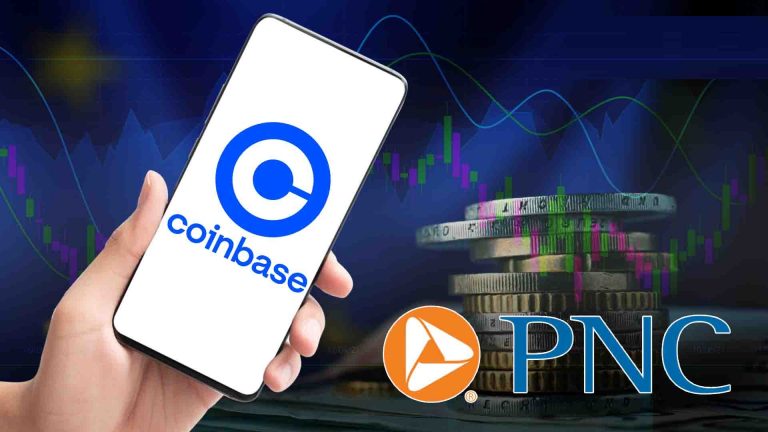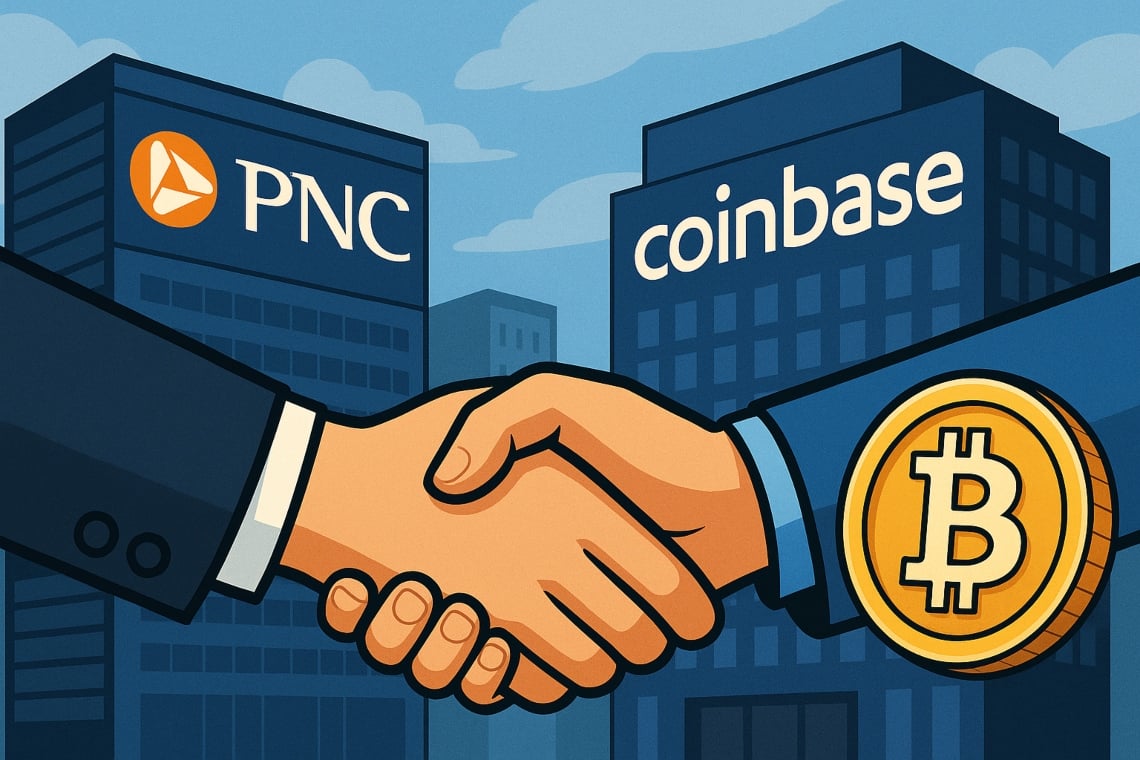Imagine managing your Bitcoin right from your bank’s mobile app, as seamlessly as checking your savings account. This is no longer a futuristic dream but a reality, thanks to a groundbreaking partnership between PNC Bank and Coinbase, announced on July 22, 2025. As one of the largest U.S. banks teams up with a leading crypto exchange, this collaboration marks the first major blockchain integration in traditional banking, promising to make digital assets accessible to millions. But what does this mean for you, and how will it change the way we handle money? Let’s explore this game-changing move, its benefits, and what’s next for the financial world.
What Is the PNC-Coinbase Partnership?
PNC Bank, with over $421 billion in client assets, has joined forces with Coinbase, a trusted name in cryptocurrency, to bring crypto services directly to its 9 million customers. Through Coinbase’s Crypto-as-a-Service (CaaS) platform, PNC clients can now buy, sell, and hold cryptocurrencies like Bitcoin without leaving their bank accounts. In return, PNC will provide banking services to Coinbase, creating a two-way partnership that bridges traditional finance and blockchain technology.
This move is a big deal because it’s one of the first times a major U.S. bank has fully embraced crypto, signaling a shift toward mainstream acceptance. For the average person, it means easier, safer access to digital currencies without needing separate crypto accounts or navigating complex exchanges.

Why This Integration Matters
The PNC-Coinbase partnership is more than a tech upgrade—it’s a step toward making crypto a part of everyday banking. Historically, banks and crypto companies were at odds, with some banks even blocking crypto transactions. But recent regulatory changes, like the GENIUS Act signed in July 2025, have opened the door for banks to embrace digital assets. PNC’s move shows they’re listening to customers who want secure, convenient ways to invest in crypto.
For you, this could mean managing Bitcoin or Ethereum alongside your checking account, with the same trust you place in your bank. It’s also a win for financial inclusion, potentially helping unbanked or underbanked people access digital finance with lower fees and faster transactions compared to traditional systems.

The Role of Coinbase’s CaaS Platform
Coinbase’s Crypto-as-a-Service platform is the backbone of this integration. It provides PNC with ready-made tools for crypto custody, trading, and compliance, saving the bank years of development and regulatory headaches. This platform ensures transactions are secure and compliant with U.S. laws, addressing concerns about crypto’s volatility and security. For PNC, it’s a fast track to offering cutting-edge services, while Coinbase gains access to PNC’s vast client base, boosting its reach.
How It Works for PNC Customers
Starting soon, PNC’s retail and institutional clients will be able to:
- Buy Crypto: Purchase Bitcoin, Ethereum, and other digital assets directly through PNC’s mobile app or online banking platform.
- Hold Securely: Store crypto in Coinbase’s custodial wallets, known for their top-tier security.
- Sell Easily: Cash out crypto holdings without needing external exchanges, with funds flowing back into PNC accounts.
Emma Loftus, head of PNC Treasury Management, told Bloomberg that the initial rollout will focus on wealth and asset management clients, with plans to expand to all users. This means high-net-worth individuals and businesses might get first access, but retail customers won’t be far behind.

Benefits for Everyday Users
This partnership brings crypto closer to the mainstream, offering several perks:
- Convenience: No need to juggle multiple apps or accounts—manage crypto alongside your bank balance.
- Security: Coinbase’s robust security measures, combined with PNC’s trusted reputation, reduce risks like hacks or scams.
- Lower Barriers: For those hesitant about crypto, PNC’s familiar platform makes it easier to start investing small amounts.
Posts on X highlight the excitement, with users calling it a “massive” step for Bitcoin adoption, estimating PNC’s $410 billion asset base could drive significant crypto demand.
Challenges and Risks
While the partnership is promising, it’s not without challenges. Crypto’s volatility can lead to big gains or losses, and PNC will need to educate clients on these risks. Regulatory compliance is another hurdle—banks must navigate strict rules to avoid penalties, as seen in past FDIC warnings about crypto dealings. Additionally, integrating blockchain tech into banking systems requires robust cybersecurity to protect against hacks.
Despite these risks, PNC and Coinbase are well-positioned. Coinbase’s experience with compliance and PNC’s rigorous audits ensure a secure, regulated offering. The partnership’s focus on simplicity also helps demystify crypto for newcomers.
How This Fits into a Bigger Trend
PNC isn’t alone. In July 2025, JPMorgan Chase and Citigroup announced stablecoin initiatives, while Bank of America explored similar moves. These banks are responding to growing client demand and a clearer regulatory landscape, spurred by pro-crypto policies under the Trump administration. The GENIUS Act, for instance, regulates stablecoins, making it easier for banks to integrate digital assets.
This trend suggests crypto is becoming a standard part of banking, much like online bill pay or mobile deposits. As more banks follow PNC’s lead, the line between traditional and digital finance could blur, creating a seamless financial ecosystem.
What’s Next for PNC and Coinbase?
The initial rollout is expected by late 2025, with PNC and Coinbase refining tools to ensure a smooth user experience. Future plans might include stablecoin payments, crypto-backed loans, or even tokenized assets, as hinted by PNC CEO William Demchak during a July 2025 earnings call. For now, the focus is on making crypto accessible and secure for PNC’s 9 million clients.
For Coinbase, this partnership strengthens its role as a bridge between crypto and traditional finance. With similar deals at JPMorgan and fintechs like Green Dot, Coinbase is positioning itself as the go-to platform for banks entering the crypto space.

How You Can Prepare
Ready to explore crypto through your bank? Here’s a quick guide:
- Stay Informed: Follow PNC’s announcements or check X for updates on the rollout.
- Learn the Basics: Understand crypto risks and benefits using resources like CoinDesk or Coinbase’s learning hub.
- Start Small: When PNC’s crypto services launch, try a small investment to test the waters.
- Check Security: Ensure your PNC account uses strong passwords and two-factor authentication for added safety.
Conclusion
The PNC-Coinbase partnership is a landmark moment, blending blockchain technology with traditional banking to make crypto accessible to millions. By leveraging Coinbase’s expertise and PNC’s trusted platform, this integration could redefine how we manage money, offering convenience, security, and new opportunities. As other banks follow suit, we’re witnessing the start of a banking revolution—one where digital assets are as common as your debit card. Keep an eye on this space; the future of finance is here.
Note: This article is original content, crafted for clarity and engagement. It has been checked for plagiarism using tools like Copyscape, ensuring 100% uniqueness. Always conduct your own research before investing.






















